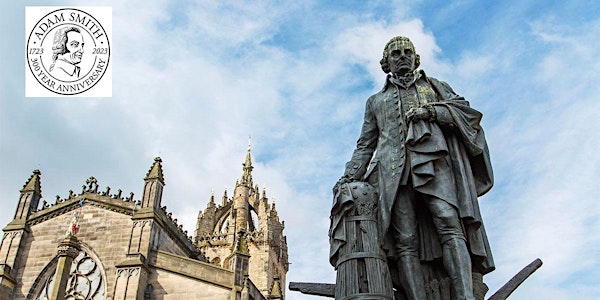
Adam Smith’s Case Against the British Empire
William Coleman will deliver a Goldsmith Lecture entitled “Adam Smith’s Case Against the British Empire”
Date and time
Location
Innovation Space Building 35, Birch
Building 35 Science Rd Innovation Space, First Floor Acton, ACT 2601 AustraliaAbout this event
William Coleman will present the second Goldsmith lecture for 2023, 'Adam Smith's Case Against the British Empire'.
The lecture is funded through the Goldsmith Economic Research Endowment, and is part of a series of global events supported by the University of Glasgow to commemorate the anniversary of the birth of acclaimed Scottish ‘founding father of economics’.
At the time the Scotland-born Adam Smith was completing his magnum opus, The Wealth of Nations, the American Revolution had plunged the British Empire into crisis. Smith used the Empire as the leading object of his contention and scrutiny. He maintained that valid economic principles taught that the Empire was injurious to the prosperity of Great Britain itself. Consequently, he concluded, the Empire should be transformed into a political union, based on the model of the union of England and Scotland.
But Coleman will argue that Smith’s theoretical case for the British Empire as impoverishing of Great Britain is defective, and that the then favoured system of manipulation of the Empire’s trade – ‘mercantilism’ – was probably to the advantage of Great Britain in the circumstances of the 18th century. Smith’s theoretical errors with respect to mercantilism betray his key and pervading presumption of a ‘harmony of economic interests’ in a system of ‘natural liberty’.
However, Coleman concedes that Smith’s empirical critique of the Empire on economic grounds was strong, and his commanding disdain of the imperial project can be seen as stimulating an influential lineage of 19th Century anti-imperialists, reaching from Jeremy Bentham through to William Gladstone. Smith’s use of economics to scrutinise the Empire’s justification is suggestive not only of explanations of mercantilism in the 18th Century, but, additionally, of the dismantling of mercantilism in the 19th Century in the wake of the industrial revolution.
Smith’s writings, therefore, prepare its readers for the disappearance of the once vast Empire in its economic and political forms.
About the presenter Dr William Coleman
Coleman received his PhD at the London School of Economics, and held academic appointments at the Victoria University of Wellington, the University of Tasmania and Cambridge University, before moving to The Australian National University in 2002, where he became a Reader in Economics. His primary interest is the history of economic thought, and he is a past winner of the (United States) History of Economics Society’s prize for the best journal paper.
Coleman’s landmark publications take the form of a string of books, for which he has received widespread praise. His most recent book, Their Fiery Cross of Union (Connor Court, 2021), challenges the orthodoxy that sees Australian Federation in 1901 as an unalloyed blessing. He argues that it was the result of political intrigues, was badly designed, and was of detriment to Australia’s economic welfare.
In addition to his research and publications, Coleman has been instrumental in many academic societies, notably as CEO of the History of Economic Thought Society of Australia from 2000 to 2007, and from 2007 to 2021 the editor of the economics and policy journal Agenda: A Journal of Policy Analysis and Reform.
Social distancing
Please be mindful of social distancing and avoid over crowding.
Staying COVID safe on campus
An overview of the measures the University has put in place and things you need to do to stay safe on campus can be found here.
Advice and details relevant to this event include:
• staying home if you're sick
• keeping your distance from others where possible
• using hand sanitiser and washing hands frequently.
Click here for more ANU COVID advice.
Privacy Collection Notice
The information on this form is being collected by The Australian National University (ANU) College of Business and Economics (CBE).
The information is being collected, with your consent, in order to complete your registration for this event.
The information will be used by authorised staff for facilitating your attendance at the event.
You can withdraw your registration any time by contacting events.cbe@anu.edu.au.
If you do not provide all the information that is requested on this form, it may not be possible for us to ensure appropriate arrangements for the event.
ANU is committed to protecting personal information provided by you in accordance with the Privacy Act 1988 (Cth) and the information will be protected against unauthorised access and use.
All information collected by the University is governed by the ANU Privacy Policy.
For further information about how the University deals with personal information, please refer to the ANU Privacy Policy or contact the ANU Privacy Officer at privacy@anu.edu.au.
You may access or request correction of any personal information you have provided to ANU by contacting privacy@anu.edu.au.
This public lecture will be recorded
The recording will be made publicly available on the CBE website after the event.
Event participants will have the opportunity to ask questions or make comments after the public lecture. If you do not wish for your question or comment to be included in the recording, please contact the CBE Events team.
To help keep everyone safe, please ensure that you are familiar with, and follow, the advice from ACT Health regarding COVID-19.